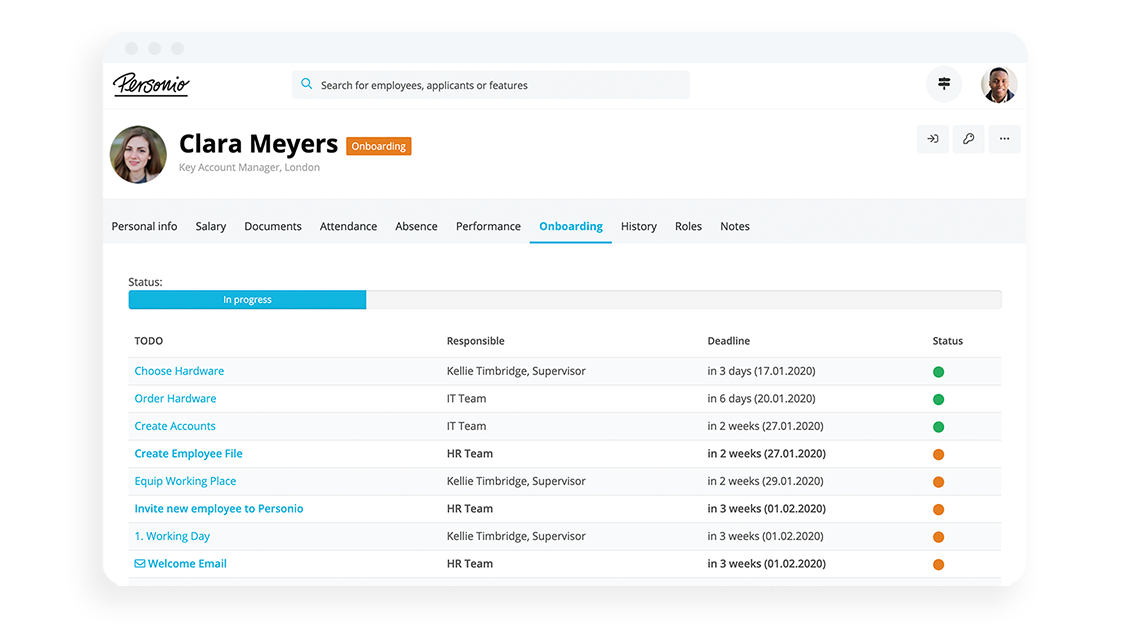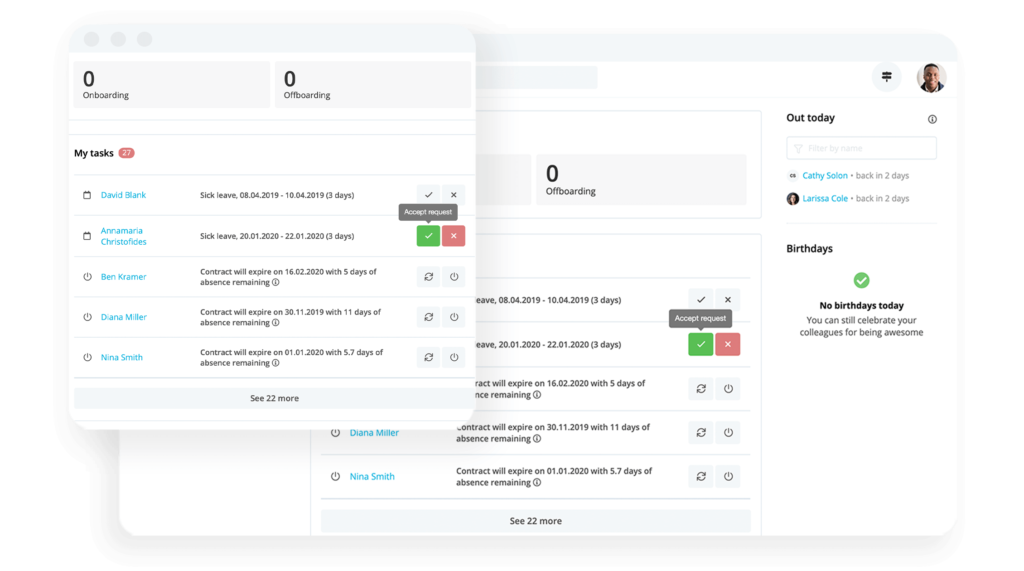HR systems, at heart, revolutionise the way teams work. But, without the right system in place, you may be limiting your team’s potential right out of the gate.
In this article, we offer an in-depth guide to these systems, how they work, how they benefit business and what you should expect from one today.
Skip to the good part by booking a demo to see Personio’s solution in action.
Contents
What are HR Systems?
The 7 Benefits of HR Systems
What Do HR Systems Look Like in Practice?
Common HR Processes for an HR System
Should An HR System Offer Automation?
What Do HR Systems Typically Cost?
What are HR Systems?
HR systems, commonly referred to as human resources management systems (HRMS) or human resources information systems (HRIS), are a way for HR teams to streamline their people processes, house their critical data and power their decision-making.
Depending on depth and expertise, an effective HR system can often cover each stage of the employee lifecycle: from attracting candidates, putting them through the recruitment process, to onboarding, developing and even offboarding them with ease.
Most of all, though, HR systems unlock time. They can even help an entire HR function gain back time to focus on more strategic topics, including:
- Workforce planning
- Succession planning
- People strategy
- And much more…
The 7 Benefits of HR Systems
Let’s talk about the benefits. More specifically, how they can help your organisation save time while boosting your bottom line.
Here are the top seven reasons to implement a proper system today:
- Gaining Back Time Through Efficiency – By their very nature, HR systems are designed to give your team time. That is done through managing and automating efficient processes across your organisation. You can spend less time ensuring your top candidate has received their contract, and more time onboarding them.
- Self-Service & Engagement – The greatest HR systems are not simply reserved for HR teams. Instead, they actively loop in employees and make it easier for them to make updates (through employee self-service), ensure their information is correct and play an active role in shaping the accuracy and reliability of the system.
- Integrated Tools & Tasks – Administrative work is rarely a joy for your employees. But, if you have an HR system that integrates with the tools they use (like Slack or Google Calendar), it can make processes easier for everyone involved.
- Data Compliance – Your employee data needs to be under lock and key, at all times. Simply having it as part of a spreadsheet won’t cut it. A compliant HR system, with strict data protection policies, will ensure your employee data stays within your org.
- Data-Driven Decisions – Accurate HR reports are table stakes for people teams who want to get in the good graces of management. If your HR system can produce reports in only a couple of clicks, your team can spend more time analysing them and taking them into discussions with key stakeholders.
- Sustainable Scaling – The best hiring teams in the world truly make use of their systems. That’s because they know they can better host candidate information, collect feedback from interviewers and even turn candidates into employees in only a click or two. Your organisation can grow as quickly as you need it to.
- Never Lose an Approval – The chain of command is crucial. When you use an HR system, you can ensure that managers, HR leaders and even the CEO are in charge and can offer documented approvals to information changes and other information. Everything is clear and nothing ever gets lost.
Automating Your HR Processes? We Can Help

What Do HR Systems Look Like in Practice?
It depends on who you ask. For some companies, an HR system may look like a jumbled mess of spreadsheets, emails and cumbersome processes. For others, it may take the form of an HR software that offers an all-in-one solution to all their people-related needs.
For many SMEs and their HR teams, the former is more true than the latter. An HR system may not even feel like much of a system at all – rather, an ad hoc collection of documents, employee data and other details scattered across various channels.
Do Startups Often Need an HR System?
Startups often need HR systems the most. Especially when it comes to putting a strong HR foundation in place. If you’re a startup whose CEO moonlights as the Head of People, a fully-functioning HR system can be a huge benefit.
This is especially true as you grow. Startups often prize their culture above all else – and having an HR system that ensures a consistent onboarding experience, for example, can ensure that your culture doesn’t fall through the cracks.
Or, let’s say you are focusing on scaling and increasing the quality of your leadership bench. An HR system that focuses on developing leaders, or even sourcing new ones, can ensure that you are maintaining a high degree of quality.
Common HR Processes for an HR System
There’s a whole host of HR processes that effective HR systems can cover. Here are some of the top ones that come to mind:
- Applicant Sourcing – Finding the top candidates across multiple channels.
- Applicant Tracking – Ensuring a smooth recruiting process interview by interviews.
- Onboarding – Designing and implementing a great start for every employee.
- Data Management – Managing data in a clear and compliant fashion.
- Attendance Tracking – Making the process of tracking attendance easy.
- Absence Management – Documenting leave and communicating it across your org.
- Performance & Training – Developing potential into top performance.
- HR Reporting – Analysis and reports that are always accurate.
Should An HR System Offer Automation?
The right ones do! Enabling automation is a critical part of the greatest HR systems. That way, tasks almost go out on their own and projects that used to take hours of manual labour can fly out the door effortlessly.
For that to work, though, you need an all-in-one solution that not only can stand on its own, but offers integrations that pull together information across your organisation’s tools and helps introduce automation across the board.
For this reason, things like People Workflow Automation truly symbolise the next era and future of work for HR teams and businesses alike.
What Do HR Systems Typically Cost?
That depends on a few key criteria, most commonly:
- The size of your company and how many employees you have
- The kind of plan you want and which features matter most to you
- If you need any add-ons to make your HR work even easier
It’s why our team at Personio developed three plans attuned to the needs of modern businesses: essential, professional and enterprise. You can take a look at each, and even try out our cost calculator, by clicking right here.
Introduce an Amazing HR Solution Today
Can we show you how Personio helps? As one of the strongest all-in-one HR systems out there, we can help automate your HR tasks, give your teams back the time they need and even make it easier for your employees to do things like plan leave and grow in their careers.
Book a demo today for a professional walkthrough from an expert. Or, start a free trial to see how it works in action.
Introduce Your Next
Great HR System





